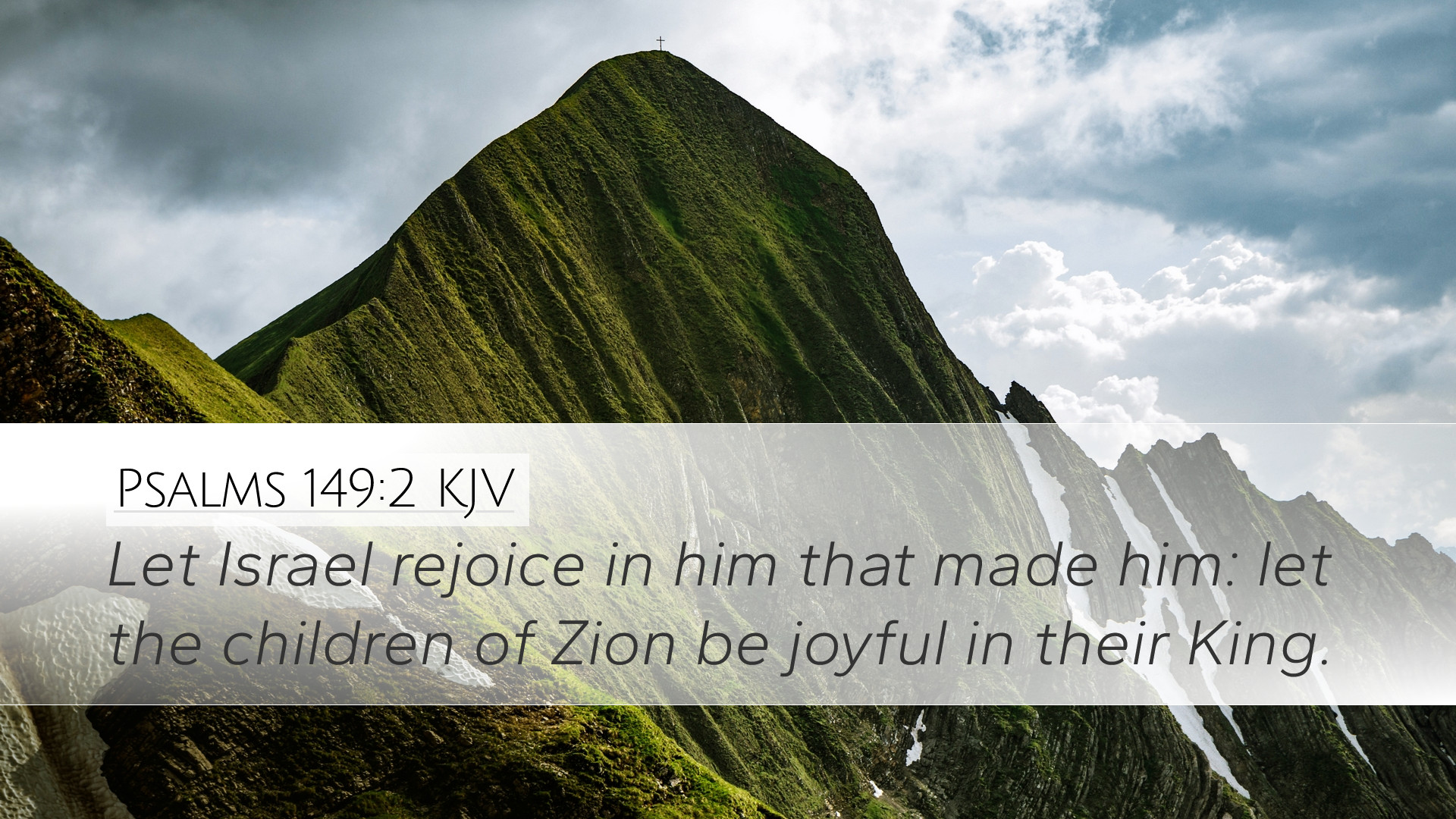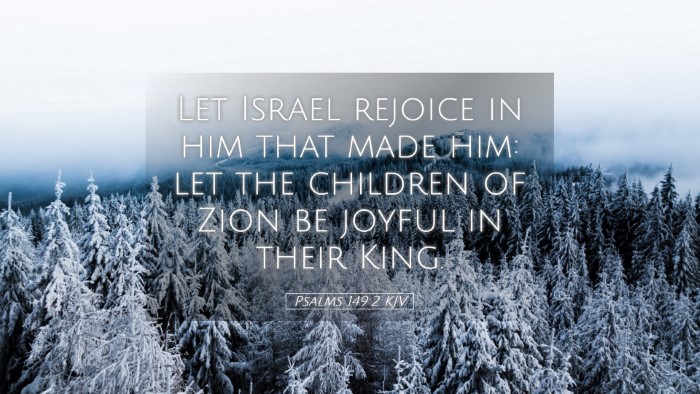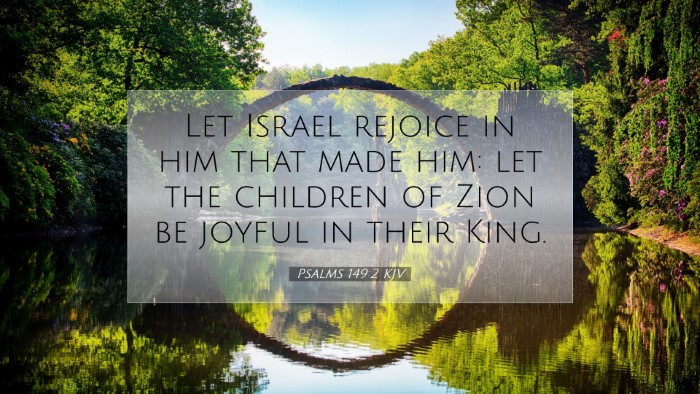Bible Commentary on Psalm 149:2
Verse: "Let Israel rejoice in their Maker; let the children of Zion be joyful in their King." (Psalm 149:2)
This verse encapsulates themes of joy and worship, highlighting both the Creator's relationship with His people and their collective response through praise. This commentary draws insights from esteemed public domain authors, including Matthew Henry, Albert Barnes, and Adam Clarke, to provide a comprehensive understanding of its spiritual significance.
Contextual Overview
The Psalms are a collection of hymns and prayers that express a wide range of emotions, from deep sorrow to ecstatic joy. Psalm 149 is categorized as a post-exilic psalm, reflecting the nation of Israel's restoration and the joy that accompanies liberation. The call to rejoice is set against the backdrop of their tumultuous history, encouraging the faithful to celebrate the faithfulness of God.
Insights from Matthew Henry
Matthew Henry emphasizes the importance of joyful worship and notes that this psalm is not just a personal invitation but a communal rallying cry for all of Israel. He states:
- Rejoicing in their Maker: Henry underscores that true joy is found in the recognition of God's creative power. The term "Maker" denotes God's role as the architect of Israel's identity and existence. Israel's joy is rooted in their understanding of who God is.
- Children of Zion: He highlights that "Zion" symbolizes not only a geographical location but also a spiritual community. As God's chosen people, their identity is intertwined with His actions on their behalf.
- Joyful in their King: The mention of God as "King" declares His sovereignty and authority. Henry points out that recognizing God as King should lead to rejoicing in the assurance of His righteousness and governance in all matters.
Insights from Albert Barnes
Albert Barnes offers a theological perspective on the implications of worship in this verse. He articulates:
- Rejoice in their Maker: Barnes comments on the pervasiveness of joy that should characterize the lives of believers. The emphasis on the Maker suggests that worship must begin with a proper understanding of who God is and what He has done, fostering a spirit of gratitude.
- Implication of Zion: The term "children of Zion" reflects the intimate relationship between God and His people. Barnes notes that joy is not merely an emotional response but a consequence of the covenant relationship established by God.
- The King’s Authority: Worship stems from recognizing God's authority as King. Barnes strengthens this argument by mentioning that proper worship aligns with obedience to God's commands, reinforcing trust and joy in the divine order.
Insights from Adam Clarke
Adam Clarke provides a critical and historical interpretation of Psalm 149:2, enriching the understanding of joy in worship:
- Historically Contextualized Joy: Clarke points out that the historical context of this psalm is crucial for understanding its call to joy. The psalm was likely written after a significant deliverance, which invokes a celebration of victory and faithfulness.
- Divine Relationships: He highlights the relational aspect of joy—in that God is not only the Maker but intimately involved in the lives of His people, bringing purpose and direction.
- Encouragement to Worship: Clarke emphasizes the necessity of active participation in worship. The psalm serves as an encouragement to believers to express their joy not just through heartfelt emotion but also through communal actions of praise, thereby affecting the entire congregation.
Theological Implications
Drawing from these commentaries, several theological implications emerge:
- Understanding of God: The psalm encourages believers to cultivate a deep understanding of God as both Maker and King, inviting them to dwell on His attributes in personal and communal worship.
- The Role of Joy in Worship: Joy is depicted as a fundamental response to God’s character and actions. Emotion is not merely a byproduct but an integral aspect of spiritual engagement with God.
- Covenantal Identity: The call to rejoice is closely tied to the identity of God's people. Israel's social and spiritual identity is affirmed through the lens of worship, reinforcing the themes of belonging and community.
Practical Applications for Pastors and Students
For pastors, students, and theologians, the insights from Psalm 149:2 can be translated into practical applications within ministry and teaching:
- Encouraging Joy in Practice: Institutions can create environments that foster joyfully expressive worship, allowing for both individual and collective experiences of God’s presence.
- Teaching Identity in Christ: This passage serves as a reminder to instruct congregations on their identity in Christ, urging them to rejoice in that emblematic relationship.
- Fostering Community Worship: Pastors can utilize the themes in this psalm to encourage congregational engagement during worship services, promoting unity in joyful expressions of faith.
Conclusion
In conclusion, Psalm 149:2 stands as a powerful reminder of the joy that comes from recognizing God as Creator and King. Through the insightful reflections of Matthew Henry, Albert Barnes, and Adam Clarke, it becomes clear that this joy leads to a vibrant and engaged worship community. Understanding the theological implications and practical applications of this verse allows for deeper connections in congregational life, motivating believers towards a life characterized by joyous worship and profound appreciation of their Maker.


